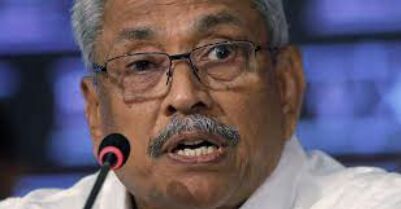Former Sri Lankan President Denies Involvement in Alleged Plot to Use Extremists for Political Gain
Former Sri Lankan President Gotabaya Rajapaksa denies allegations that he used ISIL-inspired extremists to carry out suicide bombings in order to win the 2019 presidential election. Rajapaksa dismisses the British documentary as an anti-Rajapaksa tirade.
Former Sri Lankan President Gotabaya Rajapaksa has vehemently denied allegations made in a British television program that ISIL-inspired extremists were used to carry out suicide bomb attacks in 2019 in order to create insecurity in the country and aid him in winning the presidential election that same year. In his first public statement since being removed from office in July last year, Rajapaksa dismissed the documentary on Britain's Channel 4 television as "mostly an anti-Rajapaksa tirade."
The program featured an interview with a man who claimed to have arranged a meeting between a local ISIL-inspired extremist group, known as National Thowheed Jamath, and a top state intelligence official loyal to Rajapaksa, with the goal of plotting to create instability for Rajapaksa's political advantage.
National Thowheed Jamath was accused of carrying out six suicide bomb attacks on Easter Sunday in 2019, targeting churches and tourist hotels and resulting in the deaths of 269 people. These attacks, reminiscent of the frequent suicide bombings during Sri Lanka's 25-year civil war, created a climate of fear and concern over national security, which played a significant role in Rajapaksa's eventual victory in the presidential election.
However, his tenure was short-lived, as mass protests erupted in July 2022 due to an economic crisis, leading to his resignation. The man interviewed by Channel 4, Azad Maulana, was a spokesperson for a breakaway group from the Tamil Tiger rebels, who later switched allegiance and supported the Sinhalese-dominated government in defeating the rebels and winning the civil war.
Maulana claimed that he facilitated a meeting between Islamic State-inspired extremists and a top intelligence official at the request of his boss, Sivanesathurai Chandrakanthan, the leader of the breakaway group who later became a politician. Maulana alleged that Chandrakanthan, while in prison on murder charges, met with Zainee Hashim, the brother of the leader of National Thowheed Jamath, and decided that the extremist group could be instrumental in creating instability.
Following Hashim's release from prison, he arranged a meeting between National Thowheed Jamath and a top intelligence official close to Rajapaksa. Maulana stated that he did not partake in the meeting himself but claimed that the intelligence officer informed him afterward that creating insecurity was the only means of returning the Rajapaksa family to power.
Upon viewing security camera footage of the bombings, Maulana recognized the attackers carrying bomb-laden backpacks as the individuals he had arranged to meet with the intelligence officer. However, Chandrakanthan did not respond to requests for comment, and in a subsequent speech, he accused Maulana of making false claims to expedite his asylum application.
Chandrakanthan argued that he could not have coordinated a terror attack while he was in prison. Channel 4 reported that Maulana's claims have been investigated by the United Nations and European intelligence services. Rajapaksa, in his statement, emphasized that he had no contact with the intelligence official named in the documentary from his resignation as defense ministry secretary in 2015 until he assumed the presidency in 2019.
He also asserted that the official in question was not affiliated with any intelligence agency during that period and dismissed the allegations of meeting with the suicide bombers as fabrications. Rajapaksa criticized Channel 4 for its alleged anti-Rajapaksa bias, pointing to a previous documentary by the channel which accused Sri Lankan soldiers of committing grave human rights violations during the final phase of the civil war in 2009.




